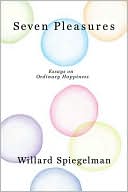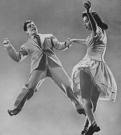Rush Limbaugh claims our right to “the pursuit of happiness” does not mean happiness is our right. He does not sound happy in his conviction, but apparently takes pleasure from repeating it. For Limbaugh, keeping what you earn is satisfying, shoring up one’s defenses in a harsh world. Muhammed Ali, demanding immediate access to the American payoff, said in his 1975 Playboy interview, “There are no pleasures in a fight, but some of my fights have been a pleasure to win,” thus converging with Limbaugh’s right wing via a mean left hook. The pursuit is all.
 But for Willard Spiegelman in Seven Pleasures, pleasure is coincident with happiness. The gap may be narrowed, if not closed, between the pursuit and the destination through the cultivation of happiness. In other words, we should want to be happy above all else, even though usually we want all else instead. (Spiegelman seems to get it wrong, per Limbaugh, when he refers to our “constitutionally guaranteed right to keep smiling.”) “I had a happy childhood,” he writes, having grown up among “children of middle-class Jewish professional parents. We weren’t tormented, just adolescent … Life in the 1950s, which cultural historians often label the conformist decade, had at least one thing going for it … We participated in the last flowering of truly middle-class culture.” Drawn early in life to the solitary pleasures of reading and writing, Spiegelman insists that these activities, along with walking, swimming, dancing, listening and looking, may develop happiness in receptive people: “We can start out happy, but we can also make ourselves happy.”
But for Willard Spiegelman in Seven Pleasures, pleasure is coincident with happiness. The gap may be narrowed, if not closed, between the pursuit and the destination through the cultivation of happiness. In other words, we should want to be happy above all else, even though usually we want all else instead. (Spiegelman seems to get it wrong, per Limbaugh, when he refers to our “constitutionally guaranteed right to keep smiling.”) “I had a happy childhood,” he writes, having grown up among “children of middle-class Jewish professional parents. We weren’t tormented, just adolescent … Life in the 1950s, which cultural historians often label the conformist decade, had at least one thing going for it … We participated in the last flowering of truly middle-class culture.” Drawn early in life to the solitary pleasures of reading and writing, Spiegelman insists that these activities, along with walking, swimming, dancing, listening and looking, may develop happiness in receptive people: “We can start out happy, but we can also make ourselves happy.”
In these seven essays, happiness works when it finds a routine. “Who said that misery was our lot? Is this our legacy from Freud?” he asks. “I believe, however, that an informed sanguinity stands a chance … rather than condescend to sanguinics, or treat them with ill-concealed contempt, I propose that we can trust and learn from them.” Spiegelman says happiness should be our habit, thus making us different from the unappreciative and dull. Confucius says we are all the same (happy then sad, closed then open, sharp then dull), and only our habits differ.
 The twenty-page introduction is itself one of the book’s most shapely and expressive essays. Here the book’s persona steps forward and hints at the urgency behind the writing. “I realized that when one is fifty, life is more than half over, which is not necessarily true at forty,” he writes. “And, therefore, after fifty, one should not do anything one does not want to do, unless it is absolutely necessary … Pleasure begins to trump duty. Voltaire said that ‘the pursuit of pleasure must be the goal of every rational person,’ and if you add maturity to rationality as a factor to account for, then after fifty it’s pleasure all the way.” (Even for Voltaire, the pursuit is the goal.) Spiegelman’s duties have included teaching English at Southern Methodist University and editing The Southwest Review. There are no pleasures in departmental committee fights, but perhaps some of those fights were a pleasure to win.
The twenty-page introduction is itself one of the book’s most shapely and expressive essays. Here the book’s persona steps forward and hints at the urgency behind the writing. “I realized that when one is fifty, life is more than half over, which is not necessarily true at forty,” he writes. “And, therefore, after fifty, one should not do anything one does not want to do, unless it is absolutely necessary … Pleasure begins to trump duty. Voltaire said that ‘the pursuit of pleasure must be the goal of every rational person,’ and if you add maturity to rationality as a factor to account for, then after fifty it’s pleasure all the way.” (Even for Voltaire, the pursuit is the goal.) Spiegelman’s duties have included teaching English at Southern Methodist University and editing The Southwest Review. There are no pleasures in departmental committee fights, but perhaps some of those fights were a pleasure to win.
Whether discussing dancing or reading, Spiegelman emphasizes the potential for self-forgetting, losing oneself in the act. “I didn’t go to literature to find myself,” he says. “My ego was well-developed by the time I became a serious young reader, and I don’t think I wanted to see myself reflected, except obliquely or obscurely, in the lives of characters about whom I was reading. It was otherness that gathered and excited my energies.” But it is unlikely that most readers will come to Seven Pleasures to experience otherness. On the contrary, Spiegelman sets up his own well-adjusted psyche as a model for emulation. His intentions are instructively benevolent, but he speaks as a reflective prototype nonetheless. The reader asks, “Can I be as appreciative of these pleasures as this man?”
In “Looking,” Spiegelman lectures on the skills involved in viewing paintings and other visual arts. “Looking, like travel, can test a friendship,” he writes. “You want someone who won’t lecture, threaten, overwhelm, bully, or (worst of all) bore you, but you also want a resource who will give information and act as a sounding board. You want a heightened, better version of yourself, a second pair of eyes.” But when Spiegelman goes to museums, “I like my space, my own company, and my solitude. I don’t want to feel obliged to speak to someone else or respond to someone else’s observations and questions, unless the person happens to have interesting ones and knows when to back off.” Is reading Spiegelman’s essay on reading as much of a pleasure as he would have us discover in such things? Does he know when to back off? Is he a sounding board or a sounding like a bore?
The answers may well depend on who the reader is. The essays appear to have been written for “the common reader,” an endangered species. But also, if you are a ballroom dancer or a habitué of the clubs, Spiegelman’s “Dancing” may have little pleasure to offer. Similarly, if you are a constant and penetrating reader, you may wonder at the presumed effect of the following paragraph from “Reading”:
 “Serious readers are solitaries for whom art is an intensely private matter. They tend to be odd, silent, obsessed, and independent or positively ornery, seldom in step with everyone else. And why would anyone want to join a book club, read the same thing as everyone else on the block, and then sit around in a circle and exchange pleasantries? Give me liberty, please. I, for one, like to read while eating (Pliny the Younger liked to be read to at meals, like those Cistercian monks later); one of the great pleasures of solitary traveling is unembarrassed reading in restaurants.”
“Serious readers are solitaries for whom art is an intensely private matter. They tend to be odd, silent, obsessed, and independent or positively ornery, seldom in step with everyone else. And why would anyone want to join a book club, read the same thing as everyone else on the block, and then sit around in a circle and exchange pleasantries? Give me liberty, please. I, for one, like to read while eating (Pliny the Younger liked to be read to at meals, like those Cistercian monks later); one of the great pleasures of solitary traveling is unembarrassed reading in restaurants.”
The interest here for me is Spiegelman’s churlish cranking about book clubs. And the implied tip not to approach his ornery self while he’s reading Kafka at Wendy’s. Spiegelman’s assertions may read blandly at times, but generally he threads enough memoirish content and literary asides to keep the pattern engrossing for the uncommon reader.
Seven Pleasures is optimally designed for the person who has entered the path of “informed sanguinity” but still needs encouragement and a pertinent vocabulary for such experiences. For instance, Spiegelman’s “Looking” suggests that advancing from “noticing” to “observing” is achieved with “the deliberateness of a Tai Chi exercise”:
“There is a path that you follow, and another that you discover. After a while you realize that you are experiencing, indeed performing, two different kinds of looking: noticing and observing. This first is random, spontaneous, and quick-eyed, requiring only the normal speed of a keen glance. The second is intentional and meditative. Seeing comes naturally; the eye darts. Looking comes with deliberation and composes the mind. Once activated, the mind settles into a paradoxical state of relaxed concentration – able to enumerate the colors, discover or invent the pictures on the walls – to focus on one thing and exclude the others.”
 Each of the essays makes a claim for its pleasurable act as a necessity as proven by tradition. In “Dancing” Spiegelman writes, “It marks, at least from the Renaissance onward, an affirmation of society’s customers and of, above all, the politesse that joins couples in marriage, then families, clans, and courts.” But that is not why Spiegelman likes to do the tango. “Neither self-expression, nor exhibition, nor exercise, nor courtship can explain the appeal of dancing to someone like me,” he says. The balance of self-revelation and selfless advice forms the rhythm of Seven Pleasures, with a bias towards the latter. Perhaps there isn’t quite enough incisive autobiographical impact and too much philosophical and literary padding in Seven Pleasures. In “Dancing” he writes, “Losing myself in the activity, rather than finding myself, it has turned out, is what appeals to me. Dancing resembles looking, listening, swimming, reading: you disappear in doing it.” But the reader goes looking for Spiegelman by habit, even as he remains well-adjustedly illegible.
Each of the essays makes a claim for its pleasurable act as a necessity as proven by tradition. In “Dancing” Spiegelman writes, “It marks, at least from the Renaissance onward, an affirmation of society’s customers and of, above all, the politesse that joins couples in marriage, then families, clans, and courts.” But that is not why Spiegelman likes to do the tango. “Neither self-expression, nor exhibition, nor exercise, nor courtship can explain the appeal of dancing to someone like me,” he says. The balance of self-revelation and selfless advice forms the rhythm of Seven Pleasures, with a bias towards the latter. Perhaps there isn’t quite enough incisive autobiographical impact and too much philosophical and literary padding in Seven Pleasures. In “Dancing” he writes, “Losing myself in the activity, rather than finding myself, it has turned out, is what appeals to me. Dancing resembles looking, listening, swimming, reading: you disappear in doing it.” But the reader goes looking for Spiegelman by habit, even as he remains well-adjustedly illegible.
 The final chapter, “Writing,” shows Spiegelman at his best. “One engages in the activity to please oneself, and if others want to overhear or to read it, so much the better,” he writes. Here Spiegelman is not precluding literary standards, but rather focusing on the solitary pleasures of writing. How odd for an editor of many years to say, “Only recently have I understood the one thing that separates writing from other forms of artistic endeavor and expression: namely, the desire, the strongly felt obligation, to be published.” But for most writers of fiction and poetry, writing and publishing are distinct pleasures, like cooking and eating. He says, “Why do I write? For one thing, it’s something I can do with relative effortlessness. Facility counts for a lot. The sanguine person often takes the path of least resistance.” Most writers, perhaps less sanguine, would say otherwise. “A person is a poet if his imagination is stimulated by the difficulties inherent in his art, and not if his imagination is dulled by them,” wrote Paul Valéry. Nevertheless, Spiegelman points out that “for at least two hundred years, everyone has complained about the proliferation of bad writing” from all these solitaries. But if you’re sanguine, “ ‘close’ is often good enough.” It is often even enough to publish.
The final chapter, “Writing,” shows Spiegelman at his best. “One engages in the activity to please oneself, and if others want to overhear or to read it, so much the better,” he writes. Here Spiegelman is not precluding literary standards, but rather focusing on the solitary pleasures of writing. How odd for an editor of many years to say, “Only recently have I understood the one thing that separates writing from other forms of artistic endeavor and expression: namely, the desire, the strongly felt obligation, to be published.” But for most writers of fiction and poetry, writing and publishing are distinct pleasures, like cooking and eating. He says, “Why do I write? For one thing, it’s something I can do with relative effortlessness. Facility counts for a lot. The sanguine person often takes the path of least resistance.” Most writers, perhaps less sanguine, would say otherwise. “A person is a poet if his imagination is stimulated by the difficulties inherent in his art, and not if his imagination is dulled by them,” wrote Paul Valéry. Nevertheless, Spiegelman points out that “for at least two hundred years, everyone has complained about the proliferation of bad writing” from all these solitaries. But if you’re sanguine, “ ‘close’ is often good enough.” It is often even enough to publish.
Spiegelman says, “Sanguine people like to learn – and try – new things. And doing new things adds to one’s ratio of sanguinity.” Writing Seven Pleasures is Spiegelman’s latest new thing. His happiness in having done so may be heard in the even tones of pleased consideration throughout. This is a genial voice, a relief to hear or, I should say, to listen carefully to.
[Published by Farrar Straus & Giroux on April 28, 2008. 197 pages, $23.00 hardcover]